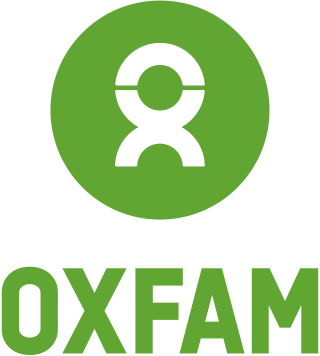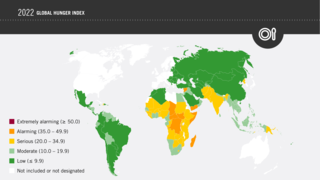
Poverty is a state or condition in which one lacks the financial resources and essentials for a certain standard of living. Poverty can have diverse environmental, legal, social, economic, and political causes and effects. When evaluating poverty in statistics or economics there are two main measures: absolute poverty compares income against the amount needed to meet basic personal needs, such as food, clothing, and shelter; relative poverty measures when a person cannot meet a minimum level of living standards, compared to others in the same time and place. The definition of relative poverty varies from one country to another, or from one society to another.
World Vision International is an ecumenical Christian humanitarian aid, development, and advocacy organization. It was founded in 1950 by Robert Pierce as a service organization to provide care for children in Korea. In 1975, emergency and advocacy work was added to World Vision's objectives. It is active in over 100 countries with a total revenue including grants, product and foreign donations of USD $3.14 billion.

A humanitarian crisis is defined as a singular event or a series of events that are threatening in terms of health, safety or well-being of a community or large group of people. It may be an internal or external conflict and usually occurs throughout a large land area. Local, national and international responses are necessary in such events.
Human security is a paradigm for understanding global vulnerabilities whose proponents challenge the traditional notion of national security through military security by arguing that the proper referent for security should be at the human rather than the national level. Human security reveals a people-centred and multi-disciplinary understanding of security which involves a number of research fields, including development studies, international relations, strategic studies, and human rights. The United Nations Development Programme's 1994 Human Development Report is considered a milestone publication in the field of human security, with its argument that ensuring "freedom from want" and "freedom from fear" for all persons is the best path to tackle the problem of global insecurity.

Islamic Relief Worldwide is a faith-inspired humanitarian and development agency which is working to support and empower the world's most vulnerable people.

World Food Day is an international day celebrated every year worldwide on October 16 to commemorate the date of the founding of the United Nations Food and Agriculture Organization in 1945. The day is celebrated widely by many other organizations concerned with hunger and food security, including the World Food Programme, the World Health Organization and the International Fund for Agricultural Development. WFP received the Nobel Prize in Peace for 2020 for their efforts to combat hunger, contribute to peace in conflict areas, and for playing a leading role in stopping the use of hunger in the form of a weapon for war and conflict.

Poverty reduction, poverty relief, or poverty alleviation is a set of measures, both economic and humanitarian, that are intended to permanently lift people out of poverty.

Malawi is one of the world's undeveloped countries and is ranked 170 out of 187 countries according to the 2010 Human Development Index. It has about 16 million people, 53% of whom live under the national poverty line and 90% of whom live on less than $2 per day.

The Global Call to Action Against Poverty (GCAP) is a network of more than 11,000 civil society organizations (CSOs) dedicated to social justice, established in 2005 during the World Social Forum in Porto Allegre. It represents approximately 58 national groups. It serves as a platform for individuals and organizations to unite against systemic factors perpetuating poverty and inequalities.

Oxfam is a British-founded confederation of 21 independent non-governmental organizations NGOs, focusing on the alleviation of global poverty, founded in 1942 and led by Oxfam International. It began as the Oxford Committee for Famine Relief in Oxford, UK, in 1942, to alleviate World War Two related hunger and continued in the aftermath of the war. By 1970, Oxfam had established an international presence, in India, Australia, Denmark, and North America.

The Global Hunger Index (GHI) is a tool that attempts to measure and track hunger globally as well as by region and by country, prepared by European NGOs of Concern Worldwide and Welthungerhilfe. The GHI is calculated annually, and its results appear in a report issued in October each year.

The aim of water security is to make the most of water's benefits for humans and ecosystems. The second aim is to limit the risks of destructive impacts of water to an acceptable level. These risks include for example too much water (flood), too little water or poor quality (polluted) water. People who live with a high level of water security always have access to "an acceptable quantity and quality of water for health, livelihoods and production". For example, access to water, sanitation and hygiene services is one part of water security. Some organizations use the term water security more narrowly for water supply aspects only.

Salil Shetty is an Indian human rights activist who was the Secretary General of the human rights organization Amnesty International (2010–2018) till 31 July 2018. Previously, he was the director of the United Nations Millennium Campaign. Before joining the UN, he served as the Chief Executive of ActionAid. Most recently, Shetty had a short stint as the Vice President of Global Programs at the Open Society Foundations.
Human trafficking in Nepal is a growing criminal industry affecting multiple other countries beyond Nepal, primarily across Asia and the Middle East. Nepal is mainly a source country for men, women and children subjected to the forced labor and sex trafficking. U.S. State Department's Office to Monitor and Combat Trafficking in Persons placed the country in "Tier 2" in 2017.
Nigeria is a source, transit, and destination country for women and children subjected to trafficking in persons including forced labour and forced prostitution. The U.S. State Department's Office to Monitor and Combat Trafficking in Persons placed the country in "Tier 2 Watchlist" in 2017. Trafficked people, particularly women and children, are recruited from within and outside the country's borders – for involuntary domestic servitude, sexual exploitation, street hawking, domestic servitude, mining, begging etc. Some are taken from Nigeria to other West and Central African countries, primarily Gabon, Cameroon, Ghana, Chad, Benin, Togo, Niger, Burkina Faso, and the Gambia, for the same purposes. Children from other West African states like Benin, Togo, and Ghana – where Economic Community of West African States (ECOWAS) rules allow for easy entry – are also forced to work in Nigeria, and some are subjected to hazardous jobs in Nigeria's granite mines. Europe, especially Italy and Russia, the Middle East and North Africa, are prime destinations for forced prostitution.Nigerians accounted for 21% of the 181,000 migrants that arrived in Italy through the Mediterranean in 2016 and about 21,000 Nigerian women and girls have been trafficked to Italy since 2015.

Water scarcity in Africa is predicted to reach dangerously high levels by 2025 when it is estimated that about two-thirds of the world's population may suffer from fresh water shortage. The main causes of water scarcity in Africa are physical and economic scarcity, rapid population growth, and climate change. Water scarcity is the lack of fresh water resources to meet the standard water demand. Although Sub-Saharan Africa has a plentiful supply of rainwater, it is seasonal and unevenly distributed, leading to frequent floods and droughts. Additionally, prevalent economic development and poverty issues, compounded with rapid population growth and rural-urban migration have rendered Sub-Saharan Africa as the world's poorest and least developed region.
Mozambique is a source and, to a much lesser extent, a destination country for men, women, and children subjected to trafficking in persons, specifically forced labor and forced prostitution. The use of forced and bonded child laborers is common in rural areas of the country, often with the complicity of family members. Women and girls from these rural areas are also lured to cities with promises of employment or education, as well as to South Africa for involuntary domestic servitude and forced prostitution. NGO's report that Mozambican victims of sex traffickers were taken by traffickers to "training centers" in Eswatini and South Africa in preparation for an expected increase in demand for prostitution during the 2010 World Cup. Young Mozambican men and boys are subjected to conditions of forced labor in South African farms and mines; they often labor for months in South Africa without pay and under coercive conditions before being turned over to police for deportation as illegal migrants. Mozambican adults are subjected to forced labor and forced prostitution in Portugal. Women and girls from Rhodesia and Malawi who voluntarily migrate to Mozambique continue to be manipulated by traffickers into forced prostitution and domestic servitude subsequent to their arrival. There are an estimated 145,600 people living in slavery in Mozambique and countless more being taken unwillingly into South Africa.

Climate change is a critical issue in Bangladesh as the country is one of the most vulnerable to the effects of climate change. In the 2020 edition of Germanwatch's Climate Risk Index, it ranked seventh in the list of countries most affected by climate calamities during the period 1999–2018. Bangladesh's vulnerability to the effects of climate change is due to a combination of geographical factors, such as its flat, low-lying, and delta-exposed topography, and socio-economic factors, including its high population density, levels of poverty, and dependence on agriculture. The impacts and potential threats include sea level rise, temperature rise, food crises, droughts, floods, and cyclones.
Protection of children’s rights is guaranteed by the Constitution of the Republic of Azerbaijan and a number of other laws. Children’s rights embrace legal, social and other issues concerning children.
In this article, NGOs in West Africa will be divided into three categories: African national NGOs, African international NGOs, and non-African international NGOs. NGOs stand for non-governmental organizations. These organizations are mostly non-profit and mostly work independently from the government, they have specific aims that range from human rights, finance, health, education and more. There are many non-governmental organizations in West Africa, and much activity between these countries, organizations and the rest of the world.












